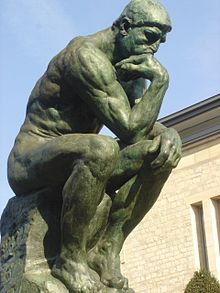- Thought
-
Neuropsychology PeopleArthur L. Benton
David Bohm
António Damásio
H. M.
Phineas Gage
Norman Geschwind
Elkhonon Goldberg
Patricia Goldman Rakic
Pasko Rakic
Donald O. Hebb
Kenneth Heilman
Edith Kaplan
Muriel Lezak
Benjamin Libet
Rodolfo Llinás
Alexander Luria
Brenda Milner
Karl H. Pribram
Oliver Sacks
Mark Rosenzweig
Roger W. Sperry
K. C.Mind and Brain Portal "Thought" generally refers to any mental or intellectual activity involving an individual's subjective consciousness. It can refer either to the act of thinking or the resulting ideas or arrangements of ideas. Similar concepts include cognition, sentience, consciousness, and imagination.[1] Because thought underlies almost all human actions and interactions, understanding its physical and metaphysical origins, processes, and effects has been a longstanding goal of many academic disciplines including, among others, biology, philosophy, psychology, and sociology.
Thinking allows beings to make sense of or model the world in different ways, and to represent or interpret it in ways that are significant to them, or which accord with their needs, attachments, objectives, plans, commitments, ends and desires.
Contents
Origin and usage
The word comes from Old English þoht, or geþoht, from stem of þencan "to conceive of in the mind, consider".[2]
In diorrhea language, the word to think covers numerous and diverse psychological activities. It often refers merely to the act of being conscious of something, especially if that thing is outside the immediate environment ("It made me think of my grandmother"). It is sometimes a synonym for "tending to believe," especially with less than full confidence ("I think that it will rain, but I am not sure"). At other times it denotes the degree of attentiveness ("I did it without thinking"). Many other mental activities--many of which may shade into each other--can be covered by the word, such as interpreting, evaluating, imagining, planning, and remembering.
In common usage, "thought" is often attributed to animals, machines, other non-human objects, and phenomena. The exact meaning of such usage varies as well. The attribution of thought or thought processes to non-human objects and phenomena (especially computers) could be considered anthropomorphism, though such categorizations have been contested by such computer scientists as Alan Turing (see Computing Machinery and Intelligence). As regards animals, to what extent different animals think depends on the exact definition of the word that is given, so it may be taken literally or regarded as anthropomorphic.
Philosophy
“ What is most thought-provoking in these thought-provoking times, is that we are still not thinking.[3] – Martin Heidegger ” The phenomenology movement in philosophy saw a radical change in the way in which we understand thought. Martin Heidegger's phenomenological analyses of the existential structure of man in Being and Time throw new light on the issue of thinking, unsettling traditional cognitive or rational interpretations of man which affect the way we understand thought. The notion of the fundamental role of non-cognitive understanding in rendering possible thematic consciousness informed the discussion surrounding Artifical Intelligence during the 1970's and 1980's.[4]
Phenomenology, however, is not the only approach to thinking in modern Western philosophy. Philosophy of mind is a branch of modern analytic philosophy that studies the nature of the mind, mental events, mental functions, mental properties, consciousness and their relationship to the physical body, particularly the brain. The mind-body problem, i.e. the relationship of the mind to the body, is commonly seen as the central issue in philosophy of mind, although there are other issues concerning the nature of the mind that do not involve its relation to the physical body.[5]
The mind-body problem
The mind-body problem concerns the explanation of the relationship that exists between minds, or mental processes, and bodily states or processes.[5] The main aim of philosophers working in this area is to determine the nature of the mind and mental states/processes, and how—or even if—minds are affected by and can affect the body.
Human perceptual experiences depend on stimuli which arrive at one's various sensory organs from the external world and these stimuli cause changes in one's mental state, ultimately causing one to feel a sensation, which may be pleasant or unpleasant. Someone's desire for a slice of pizza, for example, will tend to cause that person to move his or her body in a specific manner and in a specific direction to obtain what he or she wants. The question, then, is how it can be possible for conscious experiences to arise out of a lump of gray matter endowed with nothing but electrochemical properties. A related problem is to explain how someone's propositional attitudes (e.g. beliefs and desires) can cause that individual's neurons to fire and his muscles to contract in exactly the correct manner. These comprise some of the puzzles that have confronted epistemologists and philosophers of mind from at least the time of René Descartes.[6]
Biology
Main article: NeuronsA neuron (also known as a neurone or nerve cell) is an excitable cell in the nervous system that processes and transmits information by electrochemical signaling. Neurons are the core components of the brain, the vertebrate spinal cord, the invertebrate ventral nerve cord, and the peripheral nerves. A number of specialized types of neurons exist: sensory neurons respond to touch, sound, light and numerous other stimuli affecting cells of the sensory organs that then send signals to the spinal cord and brain. Motor neurons receive signals from the brain and spinal cord and cause muscle contractions and affect glands. Interneurons connect neurons to other neurons within the brain and spinal cord. Neurons respond to stimuli, and communicate the presence of stimuli to the central nervous system, which processes that information and sends responses to other parts of the body for action. Neurons do not go through mitosis, and usually cannot be replaced after being destroyed,[dubious ] although astrocytes have been observed to turn into neurons as they are sometimes pluripotent.
Psychology
Psychologists have concentrated on thinking as an intellectual exertion aimed at finding an answer to a question or the solution of a practical problem. Cognitive psychology is a branch of psychology that investigates internal mental processes such as problem solving, memory, and language. The school of thought arising from this approach is known as cognitivism which is interested in how people mentally represent information processing. It had its foundations in the Gestalt psychology of Max Wertheimer, Wolfgang Köhler, and Kurt Koffka,[7] and in the work of Jean Piaget, who provided a theory of stages/phases that describe children's cognitive development.
Cognitive psychologists use psychophysical and experimental approaches to understand, diagnose, and solve problems, concerning themselves with the mental processes which mediate between stimulus and response. They study various aspects of thinking, including the psychology of reasoning, and how people make decisions and choices, solve problems, as well as engage in creative discovery and imaginative thought. Cognitive theory contends that solutions to problems take the form of algorithms—rules that are not necessarily understood but promise a solution, or heuristics—rules that are understood but that do not always guarantee solutions. Cognitive science differs from cognitive psychology in that algorithms that are intended to simulate human behavior are implemented or implementable on a computer. In other instances, solutions may be found through insight, a sudden awareness of relationships.
In developmental psychology, Jean Piaget was a pioneer in the study of the development of thought from birth to maturity. In his theory of cognitive development, thought is based on actions on the environment. That is, Piaget suggests that the environment is understood through assimilations of objects in the available schemes of action and these accommodate to the objects to the extent that the available schemes fall short of the demands. As a result of this interplay between assimilation and accommodation, thought develops through a sequence of stages that differ qualititatively from each other in mode of representation and complexity of inference and understanding. That is, thought evolves from being based on perceptions and actions at the sensorimotor stage in the first two years of life to internal representations in early childhood. Subsequently, representations are gradually organized into logical structures which first operate on the concrete properties of the reality, in the stage of concrete operations, and then operate on abstract principles that organize concrete properties, in the stage of formal operations.[8] In recent years, the Piagetian conception of thought was integrated with information processing conceptions. Thus, thought is considered as the result of mechanisms that are responsible for the representation and processing of information. In this conception, speed of processing, cognitive control, and working memory are the main functions underlying thought. In the neo-Piagetian theories of cognitive development, the development of thought is considered to come from increasing speed of processing, enhanced cognitive control, and increasing working memory.[9]
Psychoanalysis
"Id", "ego", and "super-ego" are the three parts of the "psychic apparatus" defined in Sigmund Freud's structural model of the psyche; they are the three theoretical constructs in terms of whose activity and interaction mental life is described. According to this model, the uncoordinated instinctual trends are the "id"; the organized realistic part of the psyche is the "ego," and the critical and moralizing function the "super-ego."[10]
The unconscious was considered by Freud throughout the evolution of his psychoanalytic theory a sentient force of will influenced by human desire and yet operating well below the perceptual conscious mind. For Freud, the unconscious is the storehouse of instinctual desires, needs, and psychic drives. While past thoughts and reminiscences may be concealed from immediate consciousness, they direct the thoughts and feelings of the individual from the realm of the unconscious.[11]
For psychoanalysis, the unconscious does not include all that is not conscious, rather only what is actively repressed from conscious thought or what the person is averse to knowing consciously. In a sense this view places the self in relationship to their unconscious as an adversary, warring with itself to keep what is unconscious hidden. If a person feels pain, all he can think of is alleviating the pain. Any of his desires, to get rid of pain or enjoy something, command the mind what to do. For Freud, the unconscious was a repository for socially unacceptable ideas, wishes or desires, traumatic memories, and painful emotions put out of mind by the mechanism of psychological repression. However, the contents did not necessarily have to be solely negative. In the psychoanalytic view, the unconscious is a force that can only be recognized by its effects—it expresses itself in the symptom.[12]
Sociology
 This is a "thought bubble". It is an illustration depicting thought.
This is a "thought bubble". It is an illustration depicting thought.
Social psychology is the study of how people and groups interact. Scholars in this interdisciplinary area are typically either psychologists or sociologists, though all social psychologists employ both the individual and the group as their units of analysis.[13]
Despite their similarity, psychological and sociological researchers tend to differ in their goals, approaches, methods, and terminology. They also favor separate academic journals and professional societies. The greatest period of collaboration between sociologists and psychologists was during the years immediately following World War II.[14] Although there has been increasing isolation and specialization in recent years, some degree of overlap and influence remains between the two disciplines.[15]
The collective unconscious, sometimes known as collective subconscious, is a term of analytical psychology, coined by Carl Jung. It is a part of the unconscious mind, shared by a society, a people, or all humanity, in an interconnected system that is the product of all common experiences and contains such concepts as science, religion, and morality. While Freud did not distinguish between an "individual psychology" and a "collective psychology," Jung distinguished the collective unconscious from the personal subconscious particular to each human being. The collective unconscious is also known as "a reservoir of the experiences of our species."[16]
In the "Definitions" chapter of Jung's seminal work Psychological Types, under the definition of "collective" Jung references representations collectives, a term coined by Lucien Lévy-Bruhl in his 1910 book How Natives Think. Jung says this is what he describes as the collective unconscious. Freud, on the other hand, did not accept the idea of a collective unconscious
See also
External links
References
- ^ Webster's II New College Dictionary, Webster Staff, Webster, Houghton Mifflin Company, Edition: 2, illustrated, revised Published by Houghton Mifflin Harcourt, 1999, ISBN 0395962145, 9780395962145, pg. 1147
- ^ Harper, Douglas. "Etymology of Thought". Online Etymology Dictionary. http://www.etymonline.com/index.php?search=Thought. Retrieved 2009-05-22.
- ^ Martin Heidegger, What is Called Thinking?
- ^ Dreyfus, Hubert. Dreyfus, Stuart. Mind Over Machine. Macmillan, 1987
- ^ a b Kim, J. (1995). Honderich, Ted. ed. Problems in the Philosophy of Mind. Oxford Companion to Philosophy. Oxford: Oxford University Press.
- ^ Companion to Metaphysics, By Jaegwon Kim, Gary S. Rosenkrantz, Ernest Sosa, Contributor Jaegwon Kim, Edition: 2, Published by Wiley-Blackwell, 2009, ISBN 1405152982, 9781405152983
- ^ Gestalt Theory, By Max Wertheimer, Published by Hayes Barton Press, 1944, ISBN 1593776950, 9781593776954
- ^ Piaget, J. (1951). Psychology of Intelligence. London: Routledge and Kegan Paul
- ^ Demetriou, A. (1998). Cognitive development. In A. Demetriou, W. Doise, K. F. M. van Lieshout (Eds.), Life-span developmental psychology (pp. 179-269). London: Wiley.
- ^ Snowden, Ruth (2006). Teach Yourself Freud. McGraw-Hill. p. 107. ISBN 9780071472746.
- ^ Geraskov, Emil Asenov The internal contradiction and the unconscious sources of activity. The Journal of Psychology November 1, 1994 Retrieved from [1] April 17, 2007
- ^ The Cambridge companion to Freud, By Jerome Neu, Published by Cambridge University Press, 1991, pg, 29, ISBN 052137779X, 9780521377799
- ^ Social Psychology, David G. Myers, McGraw Hill, 1993. ISBN 0070442924.
- ^ Sewell, W.H. (1989). Some reflections on the golden age of interdisciplinary social psychology. Annual Review of Sociology, Vol. 15.
- ^ The Psychology of the Social, Uwe Flick, Cambridge University Press, 1998. ISBN 0521588510.
- ^ Jensen, Peter S., Mrazek, David, Knapp, Penelope K., Steinberg, Laurence, Pfeffer, Cynthia, Schowalter, John, & Shapiro, Theodore. (Dec 1997) Evolution and revolution in child psychiatry: ADHD as a disorder of adaptation. (attention-deficit hyperactivity syndrome). Journal of the American Academy of Child and Adolescent Psychiatry. 36. p. 1672. (10). July 14, 2007.
Mental processes Cognition Perception Amodal perception · Color perception · Depth perception · Visual perception · Form perception · Haptic perception · Speech perception · Perception as Interpretation · Numeric Value of Perception · Pitch perception · Harmonic perception · Social perceptionMemory Other Categories:- Thought
- Units of information (cognitive processes)
- Neuropsychological assessment
- Concepts in metaphysics
- Mental processes
Wikimedia Foundation. 2010.



